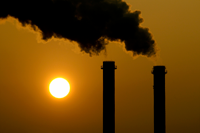
Shareholders are asking energy companies to acknowledge the risk that their carbon assets may be stranded.
For the past three years, As You Sow has been working to make sure that investors and markets understand the growing risk of investing in oil companies that pour billions of dollars into developing more fossil fuel reserves – reserves that cannot be burned without causing enormous damage to our climate. While many investors still cling to timeworn narratives about cyclical markets and the long-term value of oil companies, we’re working to make sure both Wall Street and Main Street are paying attention to climate change and its potential for creating “stranded assets.”
Global governments agree that to have a chance at avoiding the most catastrophic consequences of global warming, world temperature rise must be kept below 2 degrees Celsius. To achieve this, over two-thirds of current fossil fuel reserves must remain in the ground. If we can’t burn existing reserves without harm, why are companies investing billions of investor capital in finding even more reserves?
As You Sow has been working with shareowners in asking this important question. In 2013, along with Arjuna Capital, we pressed Exxon for a report on stranded assets that exposed their lack of carbon-constrained planning to the world. In 2014, we demanded that Chevron return capital to shareholders rather than investing it in stranding more oil and gas reserves. This year, we are presenting an innovative resolution that will enable oil majors to count renewables – instead of just oil and gas – as reserves, giving companies incentive to transition to a clean energy future.











